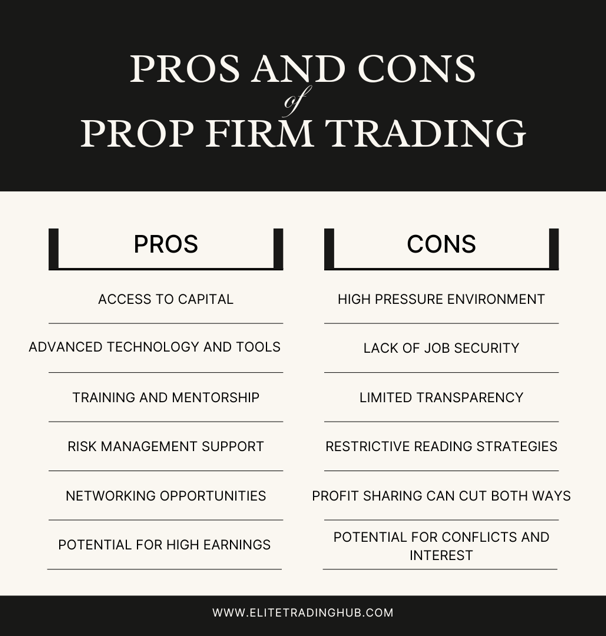The Pros and Cons of Proprietary Trading Firms: A Comprehensive Guide for Traders
Are you a trader looking to take your career to the next level? Or perhaps you're just starting out and wondering about the different paths available in the trading world. Either way, you've probably heard of proprietary trading firms, often called "prop firms" for short. But what exactly are they, and are they right for you? In this comprehensive guide, we'll dive deep into the world of prop trading, exploring its advantages and disadvantages to help you make an informed decision.
What Are Proprietary Trading Firms?
Before we jump into the pros and cons, let's make sure we're all on the same page. Proprietary trading firms are companies that use their own capital to trade financial instruments like stocks, bonds, commodities, and derivatives. Unlike traditional investment banks or hedge funds, prop firms don't manage client money. Instead, they hire traders to make trades using the firm's funds, with the goal of generating profits for the company.
Now that we've got that sorted, let's explore the ups and downs of working with a prop firm.
The Pros of Proprietary Trading Firms


1. Access to Capital
One of the biggest advantages of joining a prop firm is the access to substantial trading capital. As a beginner trader, you might not have a large sum of money to invest. Even experienced traders often find their personal capital limiting. Prop firms solve this problem by providing traders with significant amounts of capital to work with.
What this means for you: You can potentially make larger trades and, consequently, larger profits without risking your own money.
2. Advanced Technology and Tools
Prop firms invest heavily in cutting-edge trading technology and analytics tools. These resources can be expensive for individual traders to acquire on their own.
What this means for you: You'll have access to state-of-the-art trading platforms, real-time data feeds, and advanced analytical tools that can give you a competitive edge in the market.
3. Training and Mentorship
Many prop firms offer comprehensive training programs and mentorship opportunities. This is especially beneficial for newer traders but can also help experienced traders refine their skills.
What this means for you: You'll have the chance to learn from seasoned professionals and potentially accelerate your learning curve.
4. Risk Management Support
Prop firms have sophisticated risk management systems in place to protect their capital. This can help prevent catastrophic losses and teach you valuable risk management skills.
What this means for you: You'll learn to trade more responsibly and potentially develop better risk management habits that can serve you throughout your career.
5. Networking Opportunities
Working at a prop firm puts you in contact with other talented traders and industry professionals. This network can be invaluable as you progress in your career.
What this means for you: You'll have opportunities to learn from peers, share strategies, and potentially form valuable professional relationships.
6. Potential for High Earnings
Many prop firms offer profit-sharing models where traders keep a percentage of their profits. If you're successful, this can lead to significant earnings.
What this means for you: There's potential to earn much more than you might in a traditional salaried trading position, especially if you consistently perform well.


The Cons of Proprietary Trading Firms


1. High-Pressure Environment
Prop trading can be incredibly stressful. You're often expected to generate consistent profits, and there's usually little tolerance for extended periods of losses.
What this means for you: You'll need to be able to handle stress well and maintain your composure under pressure. If you're not comfortable with this kind of environment, prop trading might not be for you.
2. Lack of Job Security
Your position at a prop firm is often directly tied to your performance. If you have a string of losses or fail to meet profit targets, you might find yourself out of a job.
What this means for you: You'll need to be prepared for the possibility of sudden job loss and have a backup plan or savings to fall back on.
3. Limited Transparency
Some prop firms may not be fully transparent about their operations, fee structures, or profit-sharing models. This can lead to misunderstandings or disputes.
What this means for you: You'll need to do your due diligence before joining a firm and make sure you fully understand all terms and conditions.
4. Restrictive Trading Strategies
Some prop firms may limit the types of trades you can make or the strategies you can employ. This can be frustrating if you have a particular trading style that doesn't align with the firm's approach.
What this means for you: You might have to adapt your trading style to fit the firm's requirements, which could be challenging if you're set in your ways.
5. Profit-Sharing Can Cut Both Way
While profit-sharing can lead to high earnings, it also means you're not guaranteed a steady income. If you're not making profitable trades, your income could be significantly lower than expected.
What this means for you: You'll need to be comfortable with income volatility and have the financial stability to weather periods of lower earnings.
6. Potential for Conflicts of Interest
In some cases, the interests of the prop firm may not align perfectly with your own. For example, the firm might prioritize certain trades or strategies that benefit the company more than individual traders.
What this means for you: You'll need to be aware of these potential conflicts and make sure you're comfortable with the firm's priorities before joining.
Is Proprietary Trading Right for You?
Now that we've explored the pros and cons, you might be wondering if prop trading is the right path for you. Here are some questions to ask yourself:
However, if you prefer stability, have a low risk tolerance, or are just starting out in trading, you might want to gain more experience before considering a prop firm.
Tips for Success in Proprietary Trading
If you've decided to pursue a career in prop trading, here are some tips to help you succeed:


Do Your Research: Not all prop firms are created equal. Look for reputable firms with a track record of success and fair treatment of traders.
Develop a Solid Strategy: Before joining a firm, make sure you have a well-tested trading strategy that you're confident in.
Be Prepared to Learn: Even if you're an experienced trader, be open to learning new strategies and adapting to the firm's methods.
Manage Your Expectations: Don't expect to become a millionaire overnight. Prop trading can be lucrative, but it takes time and effort to become consistently profitable.
Focus on Risk Management: This is crucial in prop trading. Learn to protect your capital (and the firm's) by managing your risk effectively.
Network and Collaborate: Take advantage of the opportunity to learn from other traders at the firm. Collaboration can lead to new insights and strategies.
Stay Informed: Keep up with market news and continue educating yourself about trading strategies and market dynamics.
Conclusion
Proprietary trading firms offer a unique opportunity for traders to access significant capital, advanced tools, and valuable mentorship. However, they also come with high pressure, job insecurity, and potential conflicts of interest. Whether prop trading is right for you depends on your personal goals, risk tolerance, and trading style.
Remember, there's no one-size-fits-all answer in the world of trading. What works for one trader might not work for another. Take the time to carefully consider your options, do your research, and make the decision that best aligns with your trading goals and personal circumstances.
Have you had experience with prop trading firms? We'd love to hear about it in the comments here! And if you found this guide helpful, don't forget to share it with your fellow traders. Happy trading!
